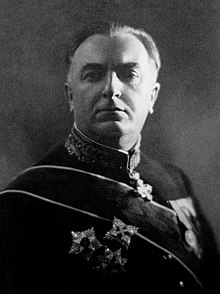Luigi Federzoni
| Luigi Federzoni | |
|---|---|
 |
|
| President of the Senate | |
|
In office 29 April 1929 – 2 March 1939 |
|
| Preceded by | Tommaso Tittoni |
| Succeeded by | Giacomo Suardo |
| Personal details | |
| Born |
September 27, 1878 Bologna, Italy |
| Died | January 24, 1967 (aged 88) Rome, Italy |
| Political party | Italian Fascist Party |
| Profession | Politician, President of the Royal Academy of Italy |
Luigi Federzoni (27 September 1878 – 24 January 1967) was a twentieth-century Italian nationalist and later Fascist politician.
Federzoni was born in Bologna. Educated at the university there, he took to journalism and literature, and for several years was on the staff of the newspaper Giornale d'Italia in Rome. He was also among the editors of the weekly newspaper L'Idea Nazionale.
Among the founders of the Nationalist movement, which later on identified itself with fascism, he was elected a deputy for one of Rome's divisions, at the elections of 1913. In the chamber he never missed an opportunity to combat the Socialists, Republicans and Democrats.
He endorsed Italy joining World War I on the side of France and the United Kingdom against Austria-Hungary and Germany. As soon as Italy intervened in the war, he joined the army as a lieutenant of artillery and was awarded a medal for valour.
Federzoni supported Benito Mussolini when the latter issued his manifesto of 26 October 1922, announcing the march on Rome. In the cabinet formed by Mussolini five days later, Federzoni was minister for the colonies. After the Matteotti murder in June 1924, Mussolini selected Federzoni for the post of minister of the interior from 1924 to 1926 and he was president of the senate from 1929 to 1939. He was also president of the Royal Academy of Italy (founded by Mussolini).
...
Wikipedia
